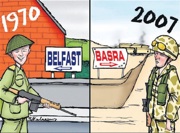
By Jim Gibney
The idea that Sinn Féin could ignore a march through Belfast city centre by a regiment in the British army, a march however it is presented which glorifies the occupation of Iraq and Afghanistan, not to mention Ireland, is patently absurd.
To expect Sinn Féin to somehow pretend Sunday’s march is not happening in a city which has experienced the worst excesses of the British army’s occupation is to expect Sinn Féin to reject its raison d’etre.
Sinn Féin is right to organise Sunday’s protest. The British Army in any guise has no right to march through the centre of Belfast. Their presence on the streets of our city is an affront to the people of this nation who have had to endure for centuries the consequences of Britain’s military occupation of Ireland.
The last forty years of conflict in the north and the thousands of people killed or injured and the legacy relatives have been left to deal with is directly attributable to partition and to the occupation by the British Army of this part of Ireland.
If those cheerleaders for the British crown forces want to appreciate how nationalists and republicans feel about Sunday’s coat-trailing exercise then they should ask themselves how they would react if the Belfast Brigade of the IRA announced they intended to march their volunteers through the centre of Belfast in tribute to all its members who lost their lives during the war.
I am not at all surprised that this march has tapped into the most reactionary and jingoistic elements inside the unionist and loyalist community but I am surprised that the British government did not intervene and block the idea of the march before it reached the stage of a proposal.
It beggars belief that the British government allowed the British Ministry of Defence the freedom to select Belfast for a march which they must have known would be deeply divisive and provocative for at least half the population of the six counties who are nationalist.
Nationalists are not the only people opposed to the wars of occupation in Iraq and Afghanistan. Prior to the invasion of Iraq many people from a unionist background marched in opposition. The Rev David Latimer, a chaplain, just back from Afghanistan, said an ecumenical service not a parade was more appropriate.
What is also disappointing about Sunday’s march is that its origins are to be found in the rivalry between the unionist parties as they try to outdo each other as the party most capable of challenging Sinn Féin and its united Ireland agenda.
The political vacuum at Stormont and the drift by the DUP away from working the power-sharing institutions are also a factor in driving unionists into a ‘little Englander’ mindset as they retreat further from the main-stream of politics and shaping a new society to the footpaths of downtown Belfast on Sunday waving little union jacks and hankering after a make-believe world that does not exist.
In defending this march unionists are indulging themselves in a fantasy world of ‘welcoming home our boys’ as if their behaviour in this country, Iraq and Afghanistan was akin to the trenches of the First World War or the fight against Hitler during the Second World War.
Wars of occupation do not equate with the First or Second World Wars. The regiment which will walk through the streets of Belfast on Sunday, the RIR, has an ignominious history. There is nothing noble in this force’s past; its parent was the Ulster Defence Regiment.
Like the B Specials before them they were a blunt and sectarian instrument which the British government used to maintain its occupation here through terrorising the nationalist and catholic people. Many innocent Catholics were killed by serving members of the UDR.
Britain’s occupation of Ireland and the consequences for the people of this island, nationalist and unionist has been well documented. Those welcoming the RIR on Sunday should dwell on what they left behind in Iraq, over 600,000 people dead, two million displaced to neighbouring countries and a similar number internally dislocated. The story is similar in Afghanistan.
Is the human toll of misery in Ireland, Iraq and Afghanistan worth celebrating either publicly or privately?
![[Irish Republican News]](https://republican-news.org/graphics/title_gifs/rn.gif)
![[Irish Republican News]](https://republican-news.org/graphics/title_gifs/harp.gif)

